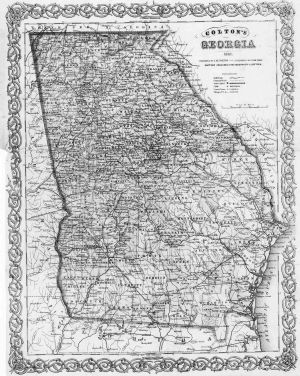 The Bethel Baptist Association in Georgia convenes today for the group’s annual meeting. Representing Southern Baptist churches in the southwestern portion of the state, the association is comprised primarily of rural and small town congregations. Collectively, associational churches have a total of 4,479 members – 2,507 white members and 1,972 “colored” members. The ratio of white and black members is not unusual in Baptist associations of the South; in many churches in Georgia and South Carolina, slaves outnumber white members.
The Bethel Baptist Association in Georgia convenes today for the group’s annual meeting. Representing Southern Baptist churches in the southwestern portion of the state, the association is comprised primarily of rural and small town congregations. Collectively, associational churches have a total of 4,479 members – 2,507 white members and 1,972 “colored” members. The ratio of white and black members is not unusual in Baptist associations of the South; in many churches in Georgia and South Carolina, slaves outnumber white members.
Attendance at the annual meeting is down this year, and the war is upon the minds of everyone present. More specifically, families are concerned about loved ones serving in distant places. Upon convening, delegates, all white, issue a resolution concerning the war. The statement reflects white views only:
Resolved: To appoint a committee whether or not it may be our duty in some way to cooperate with the brethren who are engaged in Bible Colportage among the soldiers in our Southern army; and, if so, to report to this body in what extent it may be demanded. The Committee reported as follows: With regard to Colportage among our soldiers, your committee is deeply impressed with the great importance and the pressing urgency of the work. Of the thirty five thousand valient Georgians who today are marshaled on the tented field, not a few are our own kindred, friends and neighbors. They have sacrificed their interest and their homes to defend our liberties and altars; they are exposed to privations, diseases, and death; they are surrounded by temptation, vice and crime; and whether they shall return again to their family or sink under the power of disease or fall in the day of battle, to be laid in blood stained graves, they have claims upon our sympathies and pious interest that we may not disregard. In view, however, of various considerations, that time and space will not allow us to enumerate, we can only recommend the following:
1st. That each church within the bounds of this body be kindly urged to consider the bible destitution that exists in the camps of our country’s defenders, take up early collection for its supply, and send them to the Georgia Bible and Colporteur Society, at Macon, to be expended in the purchase of Bibles and Testaments, to be forwarded to such companies or regiments as the donors may designate.
2nd. That this Association does hereby invite the Baptist brotherhood of the State of Georgia to engage at once in this good work.
3rd. That when the funds will justify it, our Georgia Bible and Colporteur Society is requested to employ a colporteur for our army, to labor at such point as may appear most needy or promise the greatest good.
The written Word of God, however, is not fit for everyone. Anxious to get Bibles in the hands of white soldiers in order that they might read the scriptures, white Georgians at the same time prohibit blacks from reading and writing. The Slave Codes of Georgia mandate “Punishment for teaching slaves or free persons of color to read”:
If any slave, Negro, or free person of color, or any white person, shall teach any other slave, Negro, or free person of color, to read or write either written or printed characters, the said free person of color or slave shall be punished by fine and whipping, or fine or whipping, at the discretion of the court.
The dangerous nature of the Bible explains the disparity. White southerners know how to interpret the Bible properly, as a sacred book that sanctifies the righteousness of African slavery. Blacks, however, if allowed to read the Bible, will gravitate to the message of freedom that permeates scripture. In segregated worship services of Bethel Baptist Association churches, preachers make certain to expound the correct view of the scriptures in order to maintain God’s will for the races. Some white Baptists in Georgia, including perhaps a few in the Bethel Association, do advocate for allowing slaves to read the Bible only – as long as it is under the supervision of whites who can properly teach blacks the meaning of the scriptures.
Sources: Alexander L. Miller, History of Bethel Baptist Association (Americus, Ga.: Gammage Print Shop, 1934), p. 73; Slave Codes of the State of Georgia, 1848″ (link)


